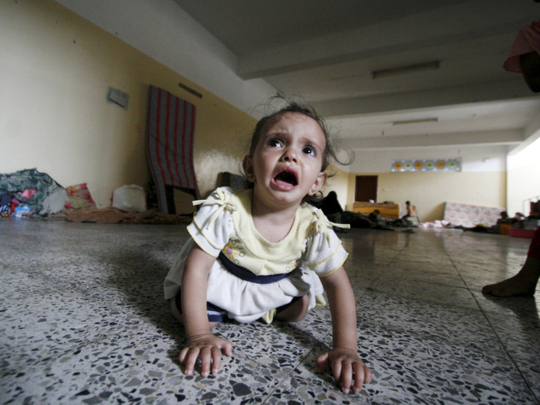
Taiz: Taiz residents have welcomed the return of the Saudi-led air campaign as the humanitarian truce ended on May 18. “The people here don’t want the strikes to stop until Saleh and Al Houthi militiamen give up their coup,” said Abdul Kader Al Guneid, physician and civil activist in Taiz.
“The war is ugly, and the truce is a lie,” he said, implying the humanitarian pause in Taiz ended minutes after it started.
Al Guneid accused the militia of using Howitzer guns to shell swathes of residential neighborhoods perched in the majestic Mount Saber mountains. Gunfire reverberated through the cloudy skies. Splinters of glass were strewn on empty footpaths, and civilians, including children and women, were killed.
Since the start of the Saudi-led coalition campaign on March 26 to dislodge Al Houthi militiamen , more than 1,820 people have been killed and 7,330 injured according to the latest figures from the United Nations. Nearly half a million people have been displaced throughout the country, in the past seven weeks.
Meanwhile, in Riyadh, Al Houthi militiamen boycotted a 3-day conference led by the Gulf Cooperation Council [GCC] titled “Saving Yemen & Building a Federal State”, insisting they would only attend if the talks were held in Yemen.
While Taiz locals have encouraged the renewed air campaign, residents in Sana’a’s Old City bemoaned the unrelenting bombing on Nuqom mountains that has shattered nearby homes. Lamees Mu’allem, a former Arabic teacher said the impact of the attacks had destroyed homes in Old City. “We’re all tired. I haven’t slept. The air is dusty, and both my mother and the children have fallen ill. Allah is with us.”
With little tribal influence or arms, the people of Taiz have always resisted the militias’ putschist tactics, and continue to do so.
Taiz is the third largest city after Sana’a and Aden and home to a large network of professionals, traders, academics or writers.
“But the arrival of Al Houthi militias in March forced its residents to drop their pens and take up arms to defend their land, “ said Osama Al Hugairi, a 24-year-old, in his final year of IT, Taiz University.
The crowded streets have been reduced to a ghost town.
“Taiz people were once full of love, life, happiness, but no more,” said Al Hugairi.
Little is known about where the militia store their weaponry, but Al Guneid confirmed that schools and public buildings are being used as barracks. Al Houthi tanks are obscured behind trees close to residential homes.
After a 10-month long dialogue, which gave birth to National Dialogue outcomes, Al Guneid said a constitution was drafted, and Saleh and Al Houthis participated in all of it.
“Then, they turned the tables upside down to gain interest that wouldn’t be possible via the ballot box.”
Faisal Farah, who manages the Al Said Library in Taiz said, “Al Houthis claim they have come here to destroy Daesh. Can you believe that? Here we have only educated and civil people.”
“Air strikes are killing our country. But what can we do to stop Al Houthis? This is the only solution to stop them,” said Farah.












